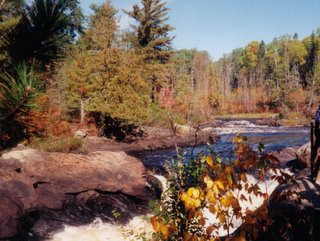 In the late 1940's, my father and I visited an old friend of my father's who had a place on the nearby river. Not far down stream from the friend's place was a widening of the river with a large bed of wild rice.
In the late 1940's, my father and I visited an old friend of my father's who had a place on the nearby river. Not far down stream from the friend's place was a widening of the river with a large bed of wild rice.It was in the fall of the year, and the Native Americans were harvesting the wild rice by pushing their canoes into the wild rice beds. The harvest process began by bending heads of the plants over the gun wales of the canoe and then beating the wild rice grains loose from the plant . One stick was to bend the plant head over the edge of the canoe and the other stick was to beat the grains loose. The grain fell into the bottom of the canoe and collected. After many hours of work the wild rice grains were brought in for further processing.
Wild rice, not related to rice, is an aquatic grass that grows from 4 to 8 feet high. Wild rice grows naturally in shallow rivers and lakes in our area. The grains are long, spindly; grayish is color.
My father and I watched and admired the skill and hard work the Native Americans used in the harvesting of the wild rice. Wild rice is a special delicacy used with fish, duck, pheasant or or sausages. It is also used as a side dish with many meats . Wild rice is rich in vitamin B. .
No comments:
Post a Comment